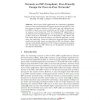Free Online Productivity Tools
i2Speak
i2Symbol
i2OCR
iTex2Img
iWeb2Print
iWeb2Shot
i2Type
iPdf2Split
iPdf2Merge
i2Bopomofo
i2Arabic
i2Style
i2Image
i2PDF
iLatex2Rtf
Sci2ools
NETWORKING
2008
2008
Towards an ISP-Compliant, Peer-Friendly Design for Peer-to-Peer Networks
Peer-to-peer (P2P) applications are consuming a significant fraction of the total bandwidth of Internet service providers (ISPs). This has become a financial burden to ISPs and if not well addressed may lead ISPs to block or put strict rate limits on P2P traffic. In this paper, we propose a new framework, PCP, for designing P2P applications to smoothly fit into the global Internet. In our framework, an ISP decides on how much of its bandwidth is to be allocated to P2P clients, and P2P clients inside the network adopt a peer-friendly algorithm to fairly share the bandwidth. Using the widely-used percentile-based charging model and real traffic traces, we show that an ISP can allocate a large amount of bandwidth dedicated to P2P, without increasing its financial cost. We also show that P2P clients can use the algorithm to fairly share the allocated bandwidth.
| Added | 29 Oct 2010 |
| Updated | 29 Oct 2010 |
| Type | Conference |
| Year | 2008 |
| Where | NETWORKING |
| Authors | Haiyong Xie 0002, Yang Richard Yang, Avi Silberschatz |
Comments (0)

